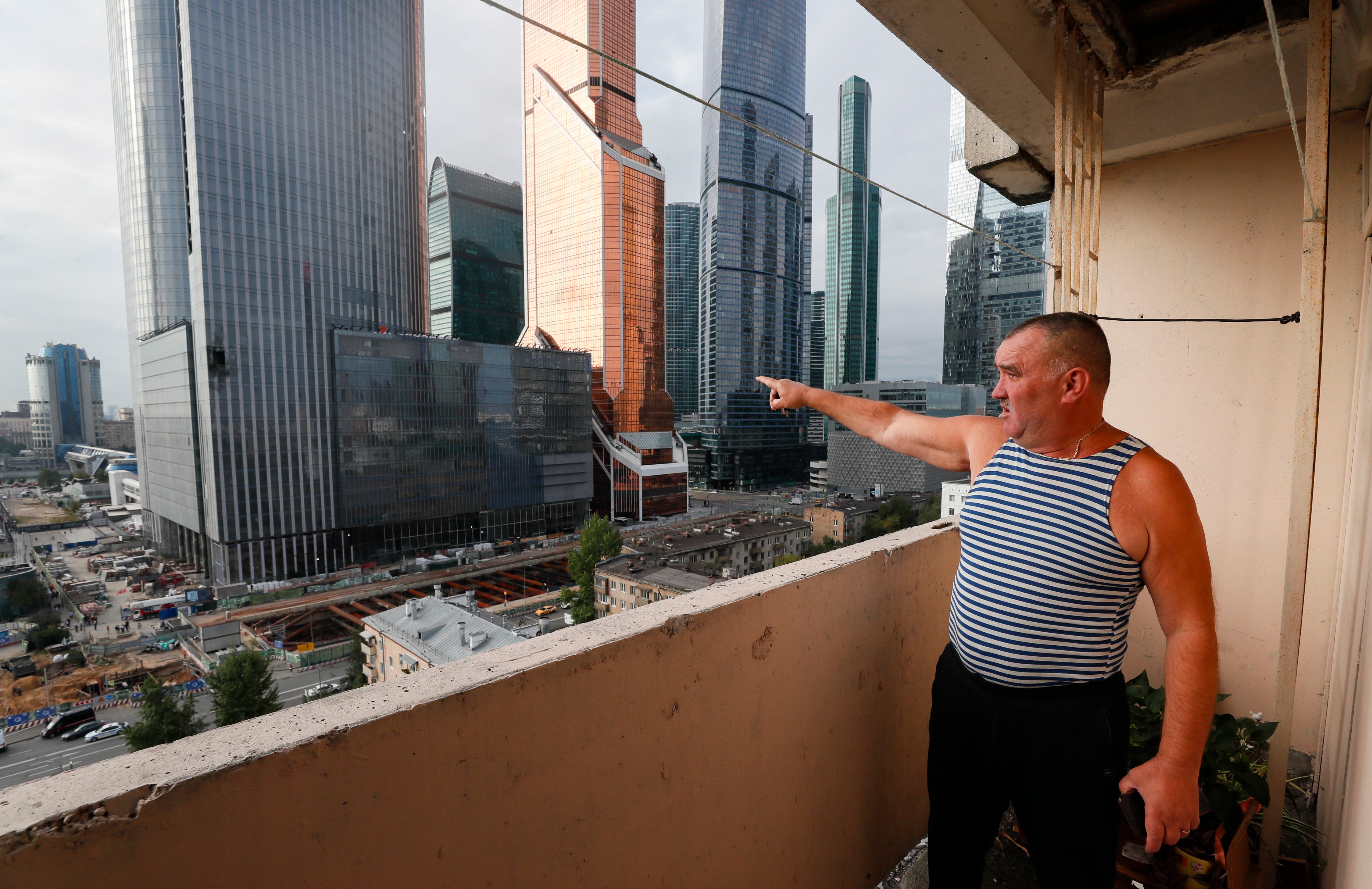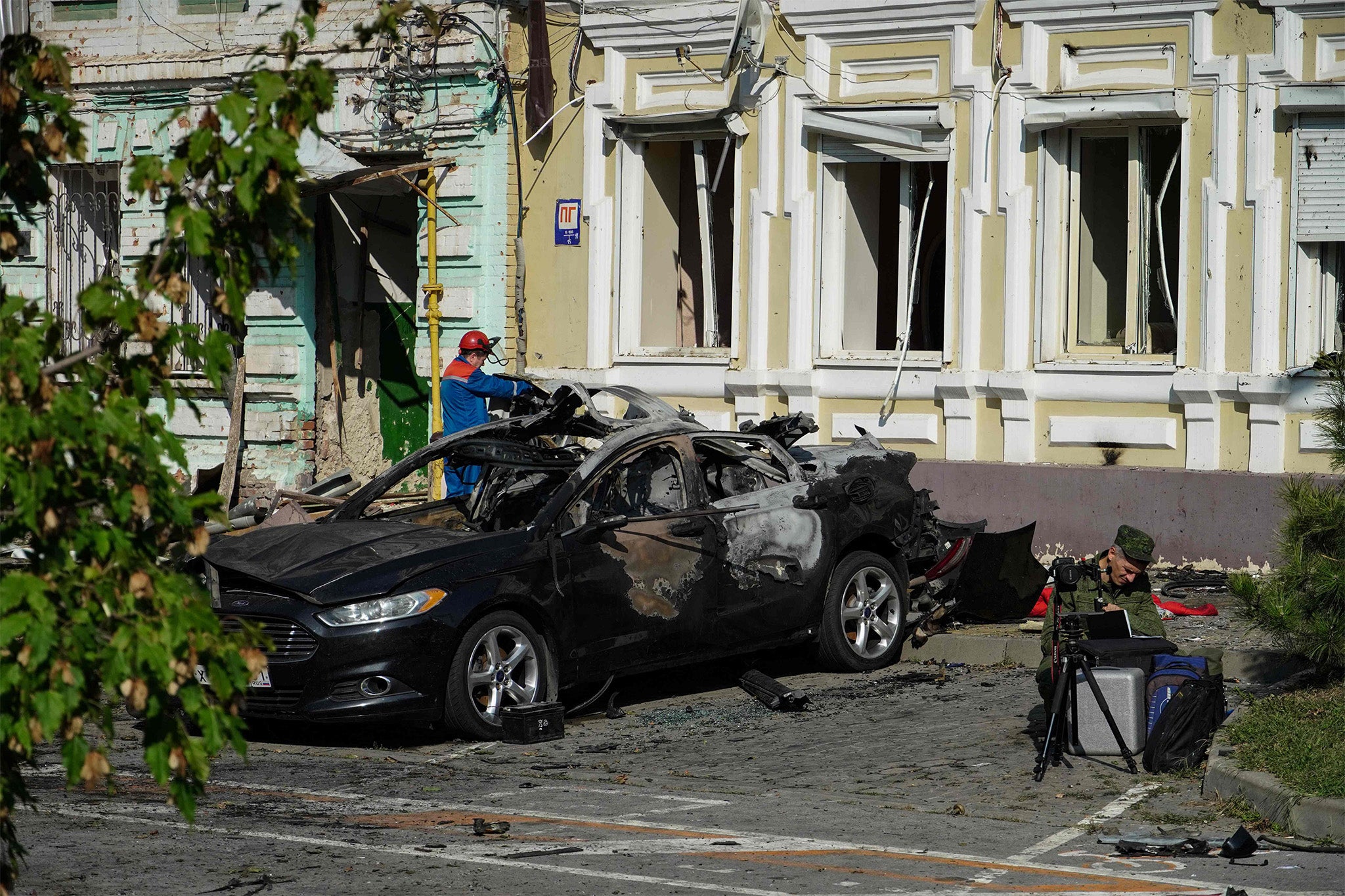How Ukraine’s month-long drone assault has brought the war home for Russians
Damage in Moscow has left ordinary Russians asking difficult questions about the purpose of the conflict in Ukraine, as Arpan Rai reports


Volodymyr Zelensky waited 17 months to admit publicly what intelligence agencies had suspected for some time: that, having kept Vladimir Putin’s forces at bay, the time had come to give Moscow a small taste of its own medicine.
“Ukraine is getting stronger,” he announced earlier this summer. “Gradually, the war is returning to the territory of Russia – to its symbolic centres and military bases, and this is an inevitable, natural and absolutely fair process.”
What followed was a month unlike any other so far in this conflict, as Russia experienced at least 80 drone strikes peppering targets from the heart of Moscow to its border regions. Some of Putin’s most expensive war machines turned into mangled ruins in air raids that confirmed even military airbases hundreds of miles from Ukraine were not safe.
Russia’s defence ministry has blamed Ukraine for drone attacks on 23 days in the past month – by far the highest rate of attacks on Russia since it launched the full-scale invasion of its former Soviet neighbour. The sustained nature of the assault has succeeded in drumming up complaints among ordinary Russians, military bloggers and ultranationalists alike, experts tell The Independent.
Between 25 August and 1 September alone, the Russian defence ministry claimed to have downed 29 Ukrainian unmanned aerial vehicles on its soil, mostly over its western regions. Ukraine does not admit publicly that it carried out any individual drone strike but officials, including Zelensky, have not denied responsibility and occasionally express satisfaction about the results of these attacks, among other hints that Kyiv is behind them.
These attacks have rattled the Telegram channels of Russian military bloggers who were previously enjoying following the war in Ukraine, showing that August’s events are making Russians sit up and pay attention, says Kateryna Stepanenko, Russia deputy lead analyst at the Institute for the Study of War.
“There’s a psychological pressure on Russian society [that was] previously pretty disengaged from the war,” she says. “They thought that it was not necessarily something that was affecting them. These drone strikes are concerning a wider Russian domestic audience that had not previously followed the war nearly as closely. So it’s kind of bringing the war back home,” she tells The Independent.
Stepanenko has been tracking the responses from the state as well as ultranationalists in Russia. Last week, she saw a prominent Russian propagandist express strong displeasure at what was unfolding in the country.
“He was going on a rant and explaining his frustrations with the number of airfields struck, he expressed that he was upset with the elites in the Kremlin, who are not trying to support the continuation of the war. So attacks on Russian territory now prompt frustration and questions over what exactly the heart and the purpose of this war is, because that’s something that Russian society had not experienced before,” she explains.
Complaints are also being raised by Russians who feel the military is not doing enough to provide aerial defences. Some are asking why Russia is dedicating so much effort into securing occupied territories in Ukraine rather than defending actual Russian cities.
And some military bloggers – used to speculating freely about the impacts of the war in Ukraine – are upset at new censorship proposals that would ban any mention of successful Ukrainian drone strikes in Russia and its occupied territories.
“Some did talk about this and say that this is ridiculous. [Saying that] this is not the time to do so, we need to be able to discuss this because that’s the only way that we are able to hold our government officials accountable for the fact that nothing has been improved in Russia itself,” Stepanenko says.
While there is no conclusive way to gauge how Russians are feeling about the drone attacks, Nikolai Petrov, a consulting fellow on the Russia and Eurasia programme at the Chatham House think tank, warns that bringing the harsh realities of war to bear on Russia itself might actually strengthen the loyalty of many Russians towards Putin.

“We should have in mind that Russia is an authoritarian state where it’s not that easy to ask direct questions, whether you do support or you do not support your leader. But it’s likely not changing their attitude towards Putin,” he says.
“This suffering can be taken as an illustration of what Putin is saying – that the West is doing its best to humiliate Russia in order to make us suffer and so on. It can play in the very opposite way [to Ukraine’s intention], strengthening rather than weakening public support [for the war],” Petrov says.
But for Jonathan Fink, a podcast host covering propaganda narratives, disinformation, and hybrid warfare in Ukraine, this is the kind of polarisation that Putin doesn’t want. “As long as Russians remain neutral, they can continue the conflict,” he says. “When that [neutral] ground is eliminated, then you see instability sown in Russian society.”
With drones now flying on both sides of the border, the strikes have become a great leveller between Ukraine and its much larger invader.
“The [Ukrainian] government is now much more open and explicit that it views attacking inside Russia as a legitimate form of retaliation. This newfound willingness to claim attacks and threaten future action is a strong signal that this is no longer a conflict that takes place exclusively on Ukraine’s territory,” says Francis Lee-Saunders, an analyst at Dragonfly, a security intelligence firm.
“The Ukrainian military and government has demonstrated over recent months that it is both willing and capable of carrying out daring and noteworthy attacks inside Russia, and that it is operating with a different tolerance to the risks of retaliation or escalation to that of Western allies,” Lee-Saunders explains.
Ukrainians are more sophisticated drone operators in general and have adapted to the lethal technology domestically much more rapidly than Russia, according to Blake Resnick, the 23-year-old CEO and founder of BRINC Drones.
At least five dozen of Resnick’s tactical Lemur drones are in operation in Ukraine.
“Ukrainian leaders have realised that these things are just incredible force multipliers when deployed at this scale, enabling their military to be much more effective and much more lethal against Russian forces,” he said.
Ukraine has developed drones for scouting missions and artillery targeting, and has custom drones for dropping munitions and suicide drones against armoured targets – all of this to achieve their military targets, Resnick explains.
Lee-Saunders says Ukraine is probably aiming to achieve several things at once by attacking Moscow in this way. “This includes trying to sow discord among the Russian government and elites, demonstrate to its own population that it can take the fight to Russia and force Russia to redistribute air defences to Moscow and potentially away from the front line.”








Join our commenting forum
Join thought-provoking conversations, follow other Independent readers and see their replies
Comments